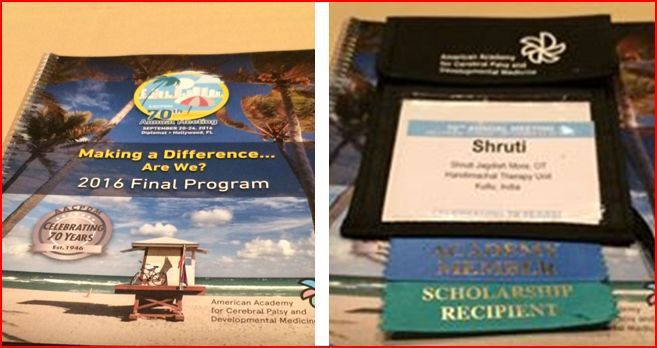After amazing experiences at the 69th meeting of AACPDM last year, where I received an International scholarship to give a presentation of the work been done at Handimachal, I got a brilliant opportunity once again to present a course at this year annual meeting in Florida (see the full programme here)
As a part of the mentorship program, I was privileged to have Nienke Dosa, Developmental Pediatrician from SUNNY, Upstate Medical University, Syracuse, been matched as a mentor for me at the meeting.
While discussing an issue related to access to Assistive Devices in the US, I shared our experiences of the developing country context of how we do not have access to most of the technology-based assistive devices and how we make do with what is available in our local low resource settings. Long debates were been done at one of the sessions, on how three mobility devices been covered by insurances was not enough and the child needed minimum 5 mobility devices. It made me think of the children back home in the mountains where even making a wooden chair was an uphill task!
Post conferences when I got back to Kullu and was still reeling under the effect of all the learning that happened at the conferences, I received a mail from Nienka, asking if I would be interested in submitting an abstract for a course presentation on Local/Global Adaptive Design for the next meeting. I was beyond excited to work on this course presentation where my topic was to give global perspective on Assistive Devices in developing countries and share ideas of positioning adaptation done in Kullu. Three other professionals joined me to work on the course. It took us 5 months to prepare the course materials. Emails were exchanged and Skype meetings were held for all of us to collaborate. Technology made this possible!
“Adaptive Design” empowers caregivers, families and the client in the design and making process by using low cost materials for custom-made design solutions. In the United States the adaptive design paradigm is increasingly being used to develop assistive technology for recreation and social participation. This is because insurance companies do not consider manufactured products that meet these needs as “medically necessary”.
In developing countries and/or remote rural areas low cost adaptive designs are the only options available for assistive technology. Some brilliant problem solving is being done in situations like these all over the world. This instructional course provided a forum for members to share design solutions from their local communities. We also oriented participants to liability, vetting, information sharing/crowd-sourcing, public policy, and community health implications of the “Adaptive Design” approach.
The forum brought together ideas and experience from New Zealand, India, Pittsburg, Toronto, Haiti, California, Mexico, Boston, Saint Lucia and Syracuse.
Participants were asked to share adaptive design solutions in this format:
(a) your community
(b) your design
(c) how the design transformed the lives of people in your community.
Apart from the course presentation, I attended other paper presentations, workshops and the general sessions. It was a cognitive overload. The two main themes that resonated with me were “The Parents’ Perspective” and “Pain”. Parents’ perspective was given attention to in almost all discussions. The caregiver’s fatigue, psychological support, financial strains, family wellbeing were some of the new perspectives I got.
Pain was discussed in the new light. The inability of our children to express pain, therapy induced pain, Pain management were the topics which made me analyze the therapy approach and child with more empathy.
A guest of honor lecture was delivered by Benjamin Joseph, MD, on “Agony and Ecstasy - a Personal 30 Year Journey of Management of Cerebral Palsy with Limited Resources in India”. It gave a very insightful picture of Cerebral Palsy in India.
I’m very thank full to Professor Nienke for the grant been made available to me and the Ortho Pediatric Travel Scholarship which made it possible for me to attend the meeting in person.
Shruti More
Occupation Therapist, Handimachal (India)






